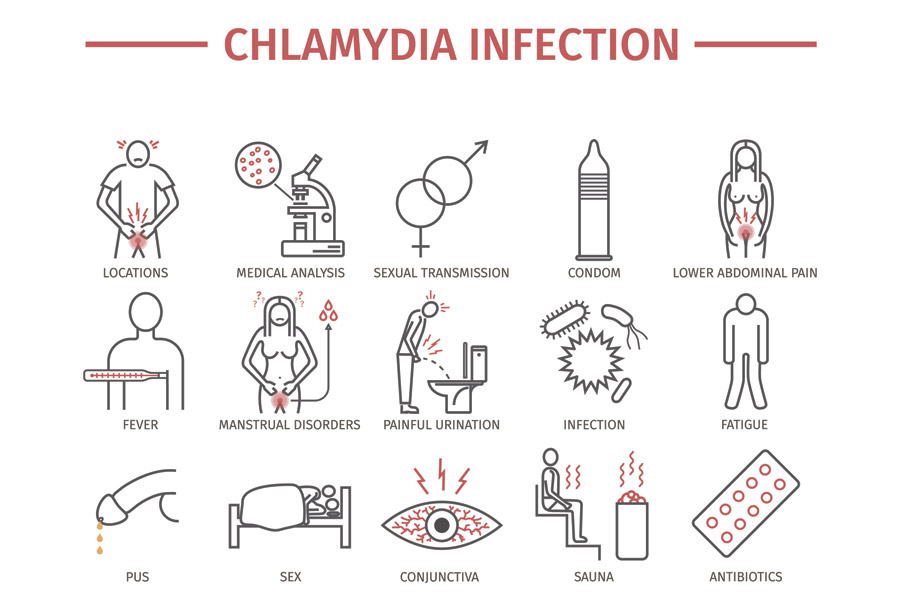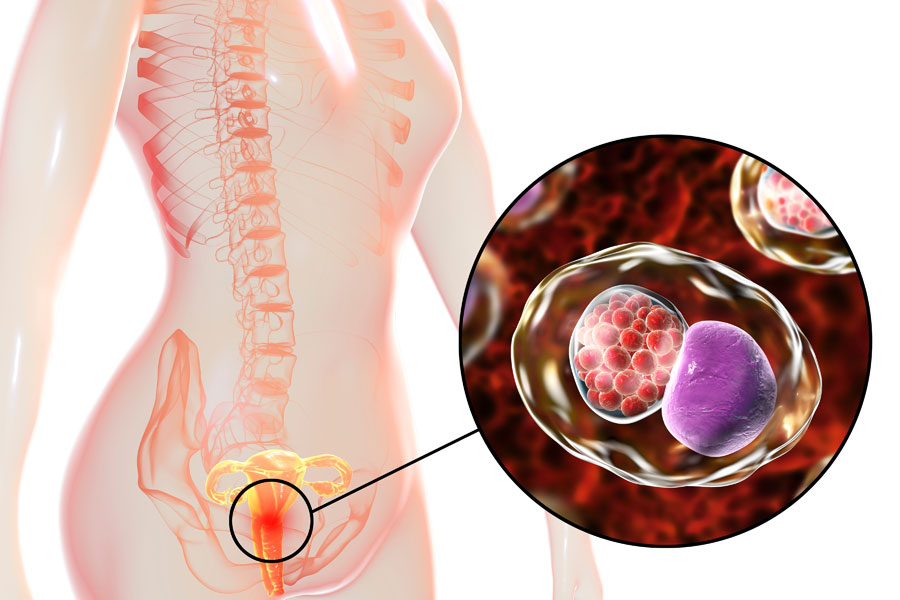Without medical treatment, chlamydia can lead to a range of serious complications including infertility. Oftentimes, the patient only finds out about them having an infectious disease when unsuccessfully trying to conceive because the disease goes with mild or without symptoms.
What is Chlamydia?
Chlamydia is a sexually transmitted infection (STI) caused by a bacteria called Chlamydia trachomatis. According to CDC, in 2018 there were four million patients with an infection. The real number, though, is hard to estimate, because the disease has unclear symptoms that are often dismissed or undetected. Studies show that two-thirds of the positive testing results are of patients aged 15–24 years, which is why the CDC urges all young people to be screened every year, and those who are older but not in a constant monogamous relationship, too.
Chlamydia can be transmitted in several ways:
- Through unprotected sex: vaginal, oral, or anal. In this case, unprotected means without a condom, as oral contraceptive pills or intrauterine devices that protect against pregnancy do not protect against STIs.
- Sharing toys that were not washed and disinfected or covered with a new condom every time they were used.
- Genital contact, including indirect, which means the person can get an infection without orgasm, ejaculation, or even the fact of intercourse.
- Infected vaginal discharge or semen getting into the eye.
In addition, if the pregnant woman has chlamydia, it can be passed to her baby during childbirth, potentially causing ophthalmia neonatorum (newborn conjunctivitis) or pneumonia.
Symptoms

The modeling researches show that, among all the patients who are infected, roughly 10% of men and 5-30% of women do start developing symptoms.
The signs of the disease for female patients, if present, may include:
- frequent urination, often accompanied by pain;
- unusual vaginal discharge;
- pain in the area of the small pelvis or lower belly;
- unpleasant to painful sensation during sexual penetration;
- bloody discharge during/after sex;
- bloody discharge between menstruations.
Chlamydia symptoms, if developed by male patients, can manifest as:
- frequent urination, often accompanied by pain;
- unusual excretion from the tip of the penis, such as watery, cloudy, or white fluids;
- burning or itching sensations in the urethra;
- testicle swelling and/or discomfort.
Chlamydia’s symptoms are somewhat reminiscent of those of gonorrhea: if the signs of these two diseases do start to appear, their clinical presentations look alike. An infected person is often unaware of their condition and transmits the bacteria to their partner if having unprotected sex. This is the reason why these two infections have first and second places, accordingly, among the most common STIs in the US. This is also the reason why regular testing is a must when having an active sexual life and/or having a new sexual partner recently.
Diagnosis
When untreated for an extended time period, chlamydia can make you infertile and lead to many unwanted complications. The best way to avoid it is to catch the disease as soon as you can and start treatment.
For the correct diagnosis, a lab test is needed. It can be provided in the medical lab or your clinic, or you can even buy a home kit for DIY testing. The screening can be done with a technology that detects antibodies to chlamydia in the fluid swab from the genitalia. In addition, medical professionals can analyze a sample of urine.
Treatment
Chlamydia trachomatis is a gram-negative coccobacillus, and, thus, is typically treated with antibiotics. Depending on the patient’s sensitivity and history, their doctor can prescribe Doxycycline or Zithromax (azithromycin). In the case of mixed infections another, more intensive medication can be needed.
It is important to not stop taking the medication even if you think the disease is now gone. When bacteria are not fully eradicated, which requires the full antibiotics course, they can become resistant to this particular drug which means it becomes ineffective and the disease becomes more difficult to treat.
You should also alert your partner, and get them tested and treated if needed. If one person in the couple has an untreated STI, they will continue to reinfect another. You should also refrain from sexual contact while getting treatment to avoid passing the infection and repeat the testing when you finish the treatment course to be sure that you are now healthy and ready to safely enjoy your sexual life.
Chlamydia and infertility
The CDC warns that chlamydial infection has a tendency to spread to the uterus or fallopian tubes and result in PID (abbreviation to pelvic inflammatory disease) which leads to tissue damage, chronic pain, inflammation, ectopic pregnancies, miscarriage, and infertility.
Fertility treatments after chlamydia
Chlamydia screening is a standard requirement both for women who are planning pregnancy and for those who are actively but unsuccessfully trying for a baby. If the screening does turn out to be affirmative, after an antibiotical therapy the woman is likely to have no problems getting pregnant. However, if the disease has developed long enough to harmfully affect the fallopian tubes and uterine tissues, the implantation of the fertilized egg can become problematic. In this event, the mother-to-be can benefit from IVF (in vitro fertilization) and reach her dream of having a child.
Summary
Chlamydia is a tricky disease that is easy to miss and can cause serious health issues. Practice safe sex; use condoms, get exams, test regularly, and screen with partner.
FAQ
Yes, without proper medical treatment, it can get complicated to a stage of infertility.
While one study suggests that PID takes several weeks to advance, the British NHS states that one in ten chlamydia-infected women could get PID within a year. There is no clear timescale regarding how long before the chlamydial infection causes infertility.
It is not directly fatal but when untreated, it can make you vulnerable to other potentially dangerous conditions, like AIDS.
Complicated chlamydial infection may lead to a miscarriage or get passed to a newly born child.







